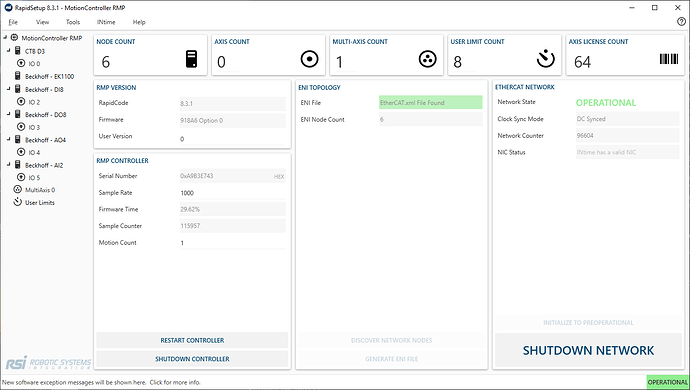I’m having intermittent problems trying to start the network from my C++ application.
The underlying symptom is that it transitions to operational, but none of the drive nodes show that they have any axes.
There are no network log messages at this point.
Here’s a brief snippet from my log.
[EtherCAT] [FSM] Starting RTOS.
[EtherCAT] [FSM] RTOS is running.
[EtherCAT] Using RMP runtime from: "c:/path/to/app/RSI"
[EtherCAT] [FSM] Attempting (try #1) to start the EtherCAT network...
[EtherCAT] Starting EtherCAT network...
[EtherCAT] [StartAttemptBegin] Network State: (256): UNINITIALIZED
[EtherCAT] Network State: (256): UNINITIALIZED
[EtherCAT] NetworkStart() took 19.235 seconds.
[EtherCAT] Network State: (260): OPERATIONAL
[EtherCAT] RMP Initialization State: OK
[EtherCAT] EtherCAT network started successfully.
[EtherCAT] [StartAttemptEnd] Network State: (260): OPERATIONAL
[EtherCAT] [FSM] EtherCAT network start attempt complete.
[EtherCAT] RMP MPI Version: 04.04.02.RMP
[EtherCAT] RMP MPI Version: 918
[EtherCAT] Rapid Code Version: 8.3.1
[EtherCAT] Axis License Count64
[EtherCAT] Network Nodes: 6
[EtherCAT] Input Nodes: 62
[EtherCAT] Output Nodes: 32
[EtherCAT] Axis Nodes: 0
What could I do that would result in this state?
I don’t see this happening when the network is already started before my application runs. (My app doesn’t attempt to start the network in that case.)
I’m using RTOS::RTOSGet()::INtimeStart() to start INtime, waiting until RTOS::RTOSGet()::INtimeStatusGet() returns INtimeStatusOK before proceeding.
I load the RTA with MotionController::CreateFromSoftware(const_cast<char*>((rsi_dir.string() + "/").c_str())) and do some initial configuration (interrupts, e.g.).
Then I call NetworkStart(r::RSINetworkStartModeOPERATIONAL,r::RSINetworkStartupMethodNORMAL,network_start_timeout_sec*1000);
After checking the network state to ensure thath it’s operational, I proceed to query for some basic info (listed above).
